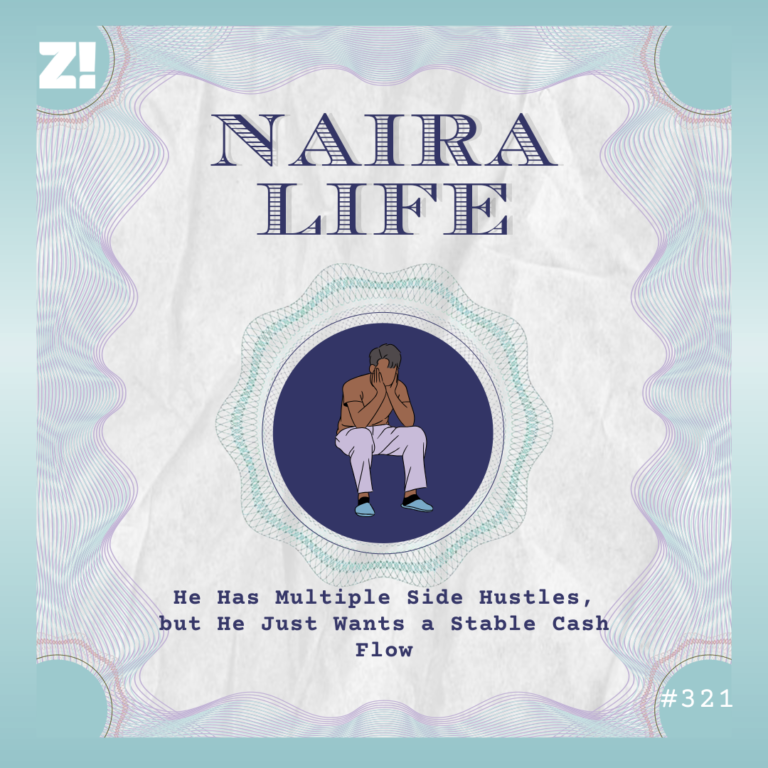Why would anyone voluntarily take a pay cut? People usually only take a lower salary offer when they want to switch careers or industries. But for Jeremiah* (27), it was because his mental health was at stake.
In this story, he shares how he realised he had to leave his dream-job-turned-toxic-nightmare after a few weeks, why taking a pay cut was necessary for him to survive and why he’s now scared of moving ahead in his career.
As told to Boluwatife
Image designed by Freepik
The unwritten rule for children in most Nigerian households is that you get an education, land a good-paying job and start taking care of your parents. It’s the whole idea behind black tax.
It’s also the main reason why I knew I wouldn’t use my economics degree even before I graduated from the university. I only studied the course because I wanted admission, and it seemed less competitive. I wanted a job that’d pay balling levels of money and allow me to give back to my struggling parents like firstborns should, but I couldn’t see a clear path to that with my degree. So, when someone introduced me to web and product design in my final year, I decided that was it: my hustle.
It didn’t take much for me to land a junior product design role at a tech startup soon after NYSC in 2020. While I didn’t have work experience, I made up for that with a portfolio of test projects. The job paid ₦100k/month, and it looked like things would only get better. I was finally on the path to making good money.
I sent my entire first salary to my parents. It’s a fairly common Yoruba practice to give your parents your first salary, they pray for you and then give you some of the salary back. My parents returned the full amount to me, touched that I decided to honour them in that way. But my new status as a salary earner signalled that they could start pushing some responsibilities to me.
And push, they did. I still lived with them, so it only made sense for me to handle some recurrent home expenses: NEPA bills, fuel for the generator or ₦10k cash gifts here and there. Of course, there was also the occasional billing from my younger siblings. It wasn’t an issue for me. I was simply playing my part.
In 2022, I got a promotion and raise to ₦200k, but by then, I was already itching to find another job. My workplace was nice, but I thought I could get paid better for my skills. A recruiter reached out to me on LinkedIn around that time and offered me a ₦350k product design team lead role at another startup. I was more excited about the fact that I would be in a senior role, so I didn’t bother to check if ₦350k was great for a non-remote one.
To me, a senior role meant my subsequent jobs would be even more senior and would consistently increase my earning potential. It was like my dream job.
I got the job in June 2022 and was to resume in July. At that point, I had about ₦300k in my savings. I’d been thinking about renting my own place for some time, and I thought I could afford it with my new salary. So, I took my savings, plus a ₦150k loan from a friend, and rented a ₦250k/year apartment that wasn’t too far from my new office. I thought moving would be a great way to start this new phase of my life.
From the very first week, I started having second thoughts about the job. There was only one other person on the product design “team”, and they’d already sent in their resignation notice.
One of the primary reasons I was hired was to make sure their mobile app was designed and ready to ship in three months. When they explained this during the interview, it sounded like I’d be part of something “life-changing” and all those motivational bullshit that make you feel gingered about going above and beyond.
But I resumed and saw that they were also in the middle of a rebrand, and I was to oversee the website redesign. What they really meant was to do it myself because where was the team I was hired to lead? How was I supposed to do both projects by myself in three months?
As if that wasn’t enough, I reported directly to the CEO, and he’d make last-minute design changes and then say, “You didn’t quite catch my vision. How hard is it to do XYZ?”
He was also verbally abusive with a horrible temper. Every Monday like clockwork, he’d scream at the sales team for not delivering revenue for a product that hadn’t even been launched. If he wasn’t screaming at them, he was berating me for not carrying out my tasks faster, even though I had no support and was almost always revising designs.
It wasn’t strange to hear people crying in toilets or resigning every week. By the third month, I was well and truly miserable. I started to have panic attacks anytime I heard a notification from my phone or laptop. No one told me before I silenced all my devices. I still do till today.
But I couldn’t just resign. I needed to stay for at least a year to finish repaying the loan and have something saved up for my rent and other living expenses. I started aggressively applying for jobs and counting down the days till I could resign.
RELATED: 8 Millennials Share the Reason Why They Stayed at a Job They Hated
Five months in, a ₦250k/month position opened up at my former workplace. I got to know because I was still friends with someone there, and they knew all about my struggles at the toxic job.
I didn’t want to apply at first. It was a significant pay cut and wasn’t a managerial role — essentially, a demotion. But then, the very next day, my toxic CEO slapped a female member of staff for trying to walk out as he screamed as usual, and I decided I was done.
I applied for the job at my former workplace, and since I’d worked there before, I didn’t have to go through many hoops. I resumed in a week.
I still remember the intense satisfaction I felt after clicking “send” on my resignation letter to the toxic job. I didn’t even wait for a response before logging out of all company platforms and dropping my laptop with the security guard.
Sometimes, I wonder if I should’ve stuck through for that year or waited for a higher-paying job. Maybe I should’ve used the experience to build a thicker skin. But then, I remind myself that it’s not until I die that I’ll have proven myself. It was either I left that job or it took my life.
My standard of living hasn’t reduced, but I spend more now. I’d gotten the apartment with the toxic job in mind. Now that I’m back at my former job, I’ve had to spend more on transportation even though I work hybrid.
I also started sending ₦50k to my parents every month when I started the toxic job. And I haven’t reduced it even though I earn less now. With inflation the way it is right now, it feels like I’m struggling at best.
I’ve been working at my current job for a year and really want to try my chances at finding a better job. But I’m scared and also a bit ashamed. What if I land another terrible job and have to return with my tail between my legs like before?
I remember how weird it was to leave the first time only to return six months later. It’s possible no one else thought it weird, but I kept thinking about it on their behalf. Like, “This one thought the grass was greener somewhere else, but he has run back.”
I don’t regret my choices, though. I just need to get comfortable with wanting better for myself and not being too scared to take risks.
ALSO READ: “I Was Used to Being Silenced” — Nigerians on Life After Leaving Their Toxic Workplaces
Psst! Have you seen our Valentine Special yet? We brought back three couples – one now with kids, one now married and the last, still best friends – to share how their relationships have evolved in the last five years. Watch the first episode below:




